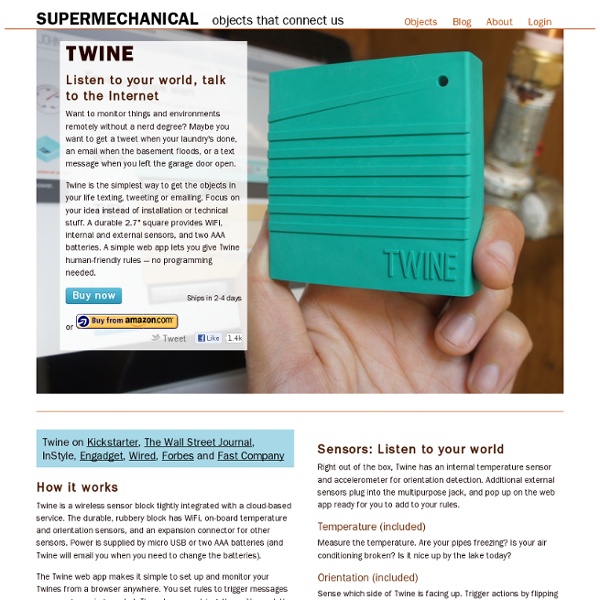



http://supermechanical.com/twine/
Internet of Things Camera - Simple remote monitoring using a first-generation Eye-Fi wireless SD card and Adafruit Data Logging Shield for Arduino Introduction The Eye-Fi card is a tiny wireless memory card. Muster Lebenslauf Vorlage One Template for the own Curriculum vitae, include the key points in the life and profession. In chronological order correct order, as well as Open and complete from birth until the day of the creation should correct Vita be written. Also in the year 2014 It will be very important, to make a good impression in any application. This Pattern-Curriculum vitae will serve as a template, to the Curriculum Vitae, as to the Curriculum vitae also likes to call with Latin names, to be able to write your own.
Use PHP to build a Twitter-like system on your site If you've been paying any attention at all, you know that Twitter is one of the biggest sensations in the Web 2.0 world. For those who don't know, Twitter (a service available at Twitter.com) is a simple microblogging service that allows users to make posts (called tweets) of up to 140 characters that answer the question "What are you doing now?" Users can follow people they find interesting and have followers of their own. Printrbot: Your First 3D Printer by Brook Drumm I designed the Printrbot to be the simplest 3D printer yet. There are some great kits out there - the Makerbot, the Ultimaker, the Prusa Mendel, and others - but none as small and simple as the Printrbot. This all-in-one 3D printer kit can be assembled and printing in a couple of hours.
Schreibe.org So the first term, SEO comes from the English Search Engine Optimization, SEO in German. The second term, SEM Search Engine Marketing, means in German search engine marketing. SMO is advertised Social Media Optimization 360Heros: 360° Video/Photo Gear – 3D Printed for GoPro® by Michael Kintner 360Heros is headed to the top of the world however we are not alone! Nepal, Mount Everest – It’s not just about heading to the top of the world, its building and collaborating resources with HP, Intel, Adobe, Dolby, ATI, DJI and 360Heros all working together to tell the story in 360 video, 3D and theatrical by supporting the Sherpas community, their school at Everest along with foundation. John(…) NAB in LasVegas April 8 – 11, 2013
Spark Socket Connects Your Regular Old Light Bulbs to the Internet Spark Devices founder Zach Supalla holding a light bulb screwed into a Spark socket. Image: Spark Devices Companies from Google to Comcast to Electric Imp are trying to connect home devices and appliances to the web, but the internet of things remains more of a complicated, distant dream than a reality. Die interessantesten WordPress Plugins für Deinen Blog Anyone familiar with the Content management system (CMS) WordPress (WP) its Web pages created, He laughs every day from new. And this above all, because it so great for this CMS and mostly free plugins are. In principle one could incidentally a WP blog also without a single active plugin operate. But in practice, this looks but otherwise usually.
HONDO Garage - Everything You Need PRO This bundle is a great way to get an 8" Barely Rig and a 50-Dollar Follow Focus with all of the accessories in one package. It includes everything you'll need to use the 50-Dollar Follow Focus with any lens and camera combination right out of the box, plus all the bits that will let you use your follow focus with geared lenses, focus whips, and alternate gearing for precision focus needed on lenses with fast aperatures. This bundle includes our Little Ledge accessory mounting plate, allowing you to mount things like audio recorders or external monitors to your Barely Rig. Monitor: An internet of airborne things THE spread of mobile phones in developing countries in the past decade has delivered enormous social and economic benefits. By providing a substitute for travel, phones can make up for bad roads and poor transport infrastructure, helping traders find better prices and boosting entrepreneurship. But although information can be delivered by phone—and, in a growing number of countries, money transferred as well—there are some things that must be delivered physically.
HTML5 enabling script 7 Jan Since HTML5 is getting more attention by way of marking up our new pages, and the only way to get IE to acknowledge the new elements, such as <article>, is to use the HTML5 shiv, I’ve quickly put together a mini script that enables all the new elements. Download html5shiv.js and must be inserted in the head element (this is because IE needs to know about the element before it comes to render them – so it can’t sit in the footer of the page, i.e. below the elements in question). I’ve updated this post to link to Alexander Farkas’s version of the shiv – it’s the very latest and my simple one line script. Dragrove - Generic gateway for internet of things Dragrove is an open source based generic gateway for internet of things. It combines Dragino (Easy Internet Access, powerful CPU, Linux system), Arduino compatible interface board (monitoring and controlling the physical world), and RF networks like X-Bee. Dragino MS12 is a wifi/linux enabled appliance for MCU projects. The goal of the Dragino is to solve the connectivity problem and greatly enhance microcontroller products. The Arduino compatible daughter board provides plug and play interface like Grove, it also provides 8 IO terminals for developers to easily create Internet of things projects, Robotics, Smart Home, Wireless Sensor Networks and many beyond.
URL Decoder/Encoder URL Decoder/Encoder Input a string of text and encode or decode it as you like.Handy for turning encoded JavaScript URLs from complete gibberish into readable gibberish.If you'd like to have the URL Decoder/Encoder for offline use, just view source and save to your hard drive. The URL Decoder/Encoder is licensed under a Creative Commons Attribution-ShareAlike 2.0 License.